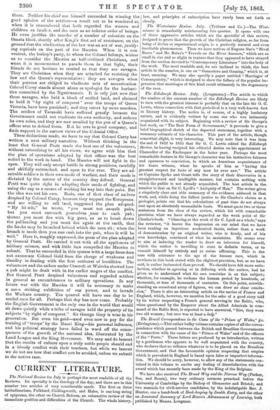The Edinburgh Review. July. (Longmans.)—The article to which the readers
of the current number of the Edinburgh Review are likely to turn with the greatest interest is probably that on the late Sir G. C. Lewis, whose connection with that periodical is a very well-known fact-
in literary history. The notice is, of course, of a highly laudatory nature, and is evidently written by some one who was intimately acquainted with its subject. Beginning with a review of Sir George's last work, on "The Best Form of Government," it proceeds to give a brief biographical sketch of the departed statesman, together with a summary estimate of his character. This part of the article, though.
somewhat slight, is very interesting. We may note that it was from the end of 1852 to 1855 that Sir G. C. Lewis edited the Edinburgh Review, he having resigned his editorial duties on his appointment as Chancellor of the Exchequer in the latter year. Perhaps the most remarkable feature in Sir George's character was his instinctive fairness-
and openness to conviction, to which an American acquaintance of his bears witness, when he speaks of him as "having the greatest respect for facts of any man he ever saw." The article on Captains Speke and Grant tells the story of their discoveries in a straightforward and intelligible manner, but contains nothing with. which the public is not already acquainted. The best article in the.
number is that on Sir C. Lyell's "Antiquity of Man." The writer gives a singularly clear and able summary of the evidence adduced in that.
work, and, while doing the fullest justice to Sir Charles's claims as a geologist, points out that his calculations of past time do not always rest upon an absolutely unassailable basis. We must quote two or three sentences from the close of the review, which hit with remarkable precision what we have always regarded as the weak point of Sir Charles's book. "Glancing at the work of Sir C. Lyell as a whole," says the reviewer, "it leaves the impression on our mind that we have been reading an ingenious academical thesis, rather than a work' of demonstration by an original writer, who is firmly, and of his own knowledge, convinced of what he maintains. He seems ever, to aim at inducing the reader to draw an inference for himself, which the author is unwilling to state in definite terms, or to
commit himself by entirely and ez animo affirming. This is the
case with reference to the age of the human race, which is nowhere in this book stated with the slightest precision, bat, as we have said, is rather insinuated than proved. We should have felt more satis-
faction, whether in agreeing or in differing with the author, had he given us to understand what his own conviction is on this subject ;
whether, for example, he reckons the human period by hundreds, or thousands, or tens of thousands of centuries. On this point, notwith- standing an occasional array of figures, we can draw no clear conclu- sion," There is also an interesting article on the navies of France and England, which, however, we mention for the sake of a good story told by its writer respecting a French general serving in the Baltic, who,
when questioned by the Emperor about the Allied Admirals in com- mand of the Baltic fleet, is reported to have answered, "Sire, they were two old women ; but ours was at least a lady."






























 Previous page
Previous page